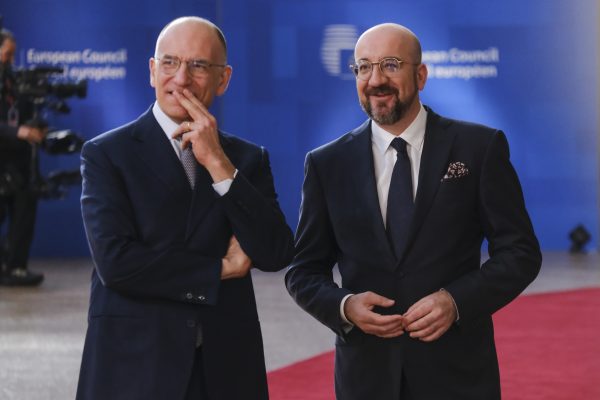Viewed from London, the EU is too tough on tech, and the US is too weak. The UK aimed to offer a compromise third path as a “uniquely progressive regulator,” says Cristina Caffarra, a leading London-based antitrust economist. But in a post-Brexit world, Caffarra adds that this goal “comes under challenge.”
When tough decisions are required, the UK’s small size and diminishing geopolitical sway force it to fall in line with one of the more prominent players. Antitrust underlines the British struggle to exert an independent third path.
Within the EU, Brussels decides on competition policy. The European Commission has handed billions of euros in fines to Microsoft, Google, and other Silicon Valley powerhouses. The bloc recently entered into force the Digital Markets Act (DMA), designed to rein in a handful of digital “gatekeepers.”
In contrast, political gridlock has prevented the US from passing significant tech regulation. While the Biden administration has launched an antitrust campaign, filing landmark cases against Google and Amazon, it must win these cases in court — and the jury is out whether it will succeed.
Outside of the EU, the UK authorities enjoy new-found freedom to block big tech mergers, issue fines, and order behavioral remedies. The country’s Competitions and Markets Authority (CMA) is, in theory, independent. While the pandemic and internal political turmoil distracted the UK, the CMA enjoyed significant autonomy, cracking down on large tech companies.
The UK regulator is also set to receive additional powers. Under a new Competition and Consumers Bill making its way through Parliament, the CMA’s new Digital Markets Unit will be able to identify and impose obligations of big tech companies ex-ante before they cause consumer or competitive harm.
The new regulation resembles the EU’s DMA but with a crucial twist. The DMA creates a set menu of requirements and restrictions. The UK’s Digital Markets Unit is “flexible with how they impose obligations” on tech companies, says leading antitrust lawyer Antonio Bavasso. This flexibility allows it to adapt to threats as they arise.
Despite these distinguishing features, the country suffers from one fundamental problem: its size. The US and the EU combine to generate around 30% of global GDP. Britain accounts for a mere two percent. Tech companies with enormous market capital fail to treat the UK as an equal. While this is a problem faced by even the most significant economies, it seems particularly true in the UK.
Microsoft’s proposed $68 billion purchase of game maker Activision underlines this squeeze. The UK turned down the purchase, saying it threatened to cut off competition in the nascent market for online gaming. But the EU went ahead and okayed the merger. The US took it to court, only to have a judge force it to relent.
Once it became clear that the US was going to accept the Microsoft — Activision deal, the British regulator changed its tune and provisionally approved, arguing that the merger now gives UK customers a better deal than their counterparts in the EU. Although Microsoft did offer some changes, they do not seem substantially different from previous concessions made by the company ahead of the EU’s approval. Microsoft had already agreed to licensing Activision’s catalog to other streaming services.
The lesson is clear. The UK cannot remain the only holdout in a big tech merger. From a political perspective, the CMA’s independence is also coming under question. After the CMA blocked Microsoft — Activision, Chancellor of the Exchequer Jeremy Hunt publicly stated that the regulator should consider its “responsibilities for economic growth.”
Even so, the UK could continue to play a role in competition policy. “From a regulatory perspective, the UK can and should continue to perform a role of intellectual leadership,” suggests Bavasso. Suppose it can convince its allies of its position. In that case, the independent regulator may be uniquely positioned to assess the harms of big technology companies — even if it will not ultimately be the one calling the shots.
When it comes to distinguishing itself on the global stage, the UK should focus less on competition policy — and more on its original post-Brexit goal of supporting entrepreneurs and innovation. A 2019 report for the UK government encouraged policies that “actively promote competition” beyond traditional antitrust measures.
The UK can still be a digital beacon, home to Europe’s most vibrant VC and start-up culture, bolstered by some of the continent’s best universities. But it needs to stop looking at large tech companies as less of a problem and more as an opportunity.
Clara Riedl-Riedenstein is an intern at CEPA’s Digital Innovation Initiative.
Bill Echikson is a non-resident CEPA Senior Fellow and editor of Bandwidth.
Bandwidth is CEPA’s online journal dedicated to advancing transatlantic cooperation on tech policy. All opinions are those of the author and do not necessarily represent the position or views of the institutions they represent or the Center for European Policy Analysis.





